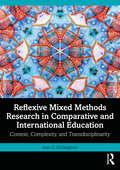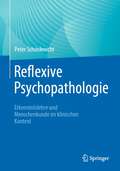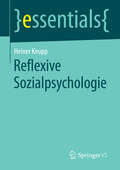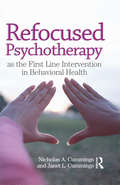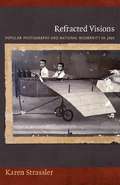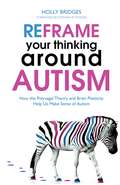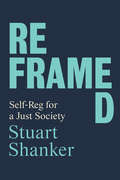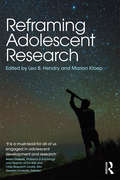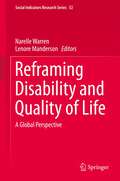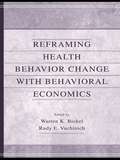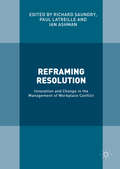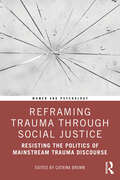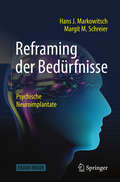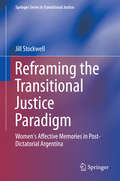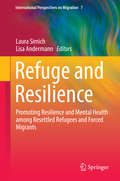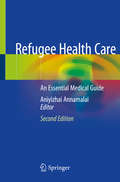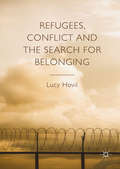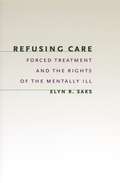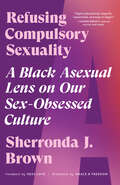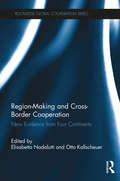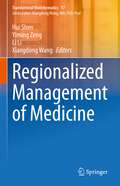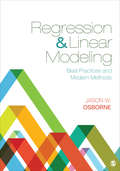- Table View
- List View
Reflexive Mixed Methods Research in Comparative and International Education: Context, Complexity, and Transdisciplinarity
by Joan G. DeJaeghereResponding to both the increase of mixed methods research (MMR) and the lack of dialogue about its philosophical and methodological practices in comparative and international education (CIE) Reflexive Mixed Methods Research in Comparative and International Education: Context, Complexity, and Transdisciplinarity offers readers an overview of different philosophical approaches to mixed methods, as well as the practical processes to engage in MMR with reflexivity.Comparing reflexivity to a kaleidoscope, the author describes how it can be used throughout the research process to engage with different paradigms and methods, as well as to integrate findings and consider emerging interconnections. The book discusses various ways to reflexively adapt designs, methods, and analyses, and integrate findings in MMR to better contextualize knowledge in the field of CIE. It illustrates different approaches to MMR through various case summaries, and each chapter poses reflexive questions for researchers to consider during their research projects. It emphasizes a critical realist approach, particularly for how it involves epistemological pluralism while also offering contingent explanations to educational questions. Through a reflexive approach, the book offers possibilities for conducting better and more epistemically just MMR.This is fascinating reading for both new and more experienced researchers to expand the craft of researching with MM. Interdisciplinary and transdisciplinary teams, as well as sole researchers, will find concrete research practices in the book for employing reflexive MMR to understand complex educational issues.
Reflexive Psychopathologie: Erkenntnislehre und Menschenkunde im klinischen Kontext
by Peter SchönknechtPsychopathologie stellt den Begriffsapparat dar, mit dem Veränderungen, Störungen oder Krankheiten der Psyche erfasst werden können. Das methodische Verständnis von Psychopathologie ist umstritten und variiert in Abhängigkeit davon, ob man psychische Phänomene mit biologischen, psychologischen oder soziologischen Methoden untersucht. Psychopathologie hat die – immer schon begriffliche – Erfassung psychischer Veränderung als solcher zum Ziel und versteht sich nicht als alternative Methode neben den Naturwissenschaften, sondern als Grundlagenwissenschaft psychischer Verfasstheit überhaupt. Ihr Untersuchungsgegenstand erfordert eine Methode, die neben dem Instrument der fachbegrifflichen Erkenntnis auch das Verhältnis der erkennenden Subjekte zu ihrem Gegenstandsbereich einschließt – oder anders ausgedrückt, Psychopathologie kann als Grundlagenwissenschaft erst im Ergebnis ihrer Methodenreflexion wirken. Im ersten Teil dieses Buches werden die zentralen Kategorien der Psychopathologie parallel zu ihrer transzendentalphilosophischen Begründung vorgestellt. Auf diesem Hintergrund lassen sich die Mehrzahl der behaupteten Methodenkonflikte als Dilemmata ausweisen. Am Beispiel des Wahnsyndroms soll der Versuch einer fachbegrifflichen Auflösung der Dilemmata geprüft werden. Im zweiten Teil werden die Erträge der Diskussion um den spezifischen Charakter des Psychischen dargestellt und als zirkulär oder dogmatisch kritisiert. Gleichermaßen sollen die Merkmale gelungener Deutungsversuche untersucht und auf ihre Anschlussfähigkeit hin geprüft werden. Ertragreich erwies sich die Begründung der Psychopathologie als Idee der Bewusstheit einer rationalen Psychologie. Als Kriterien für eine sinnvolle psychopathologische Begriffsbildung wurden die Transparenz für die Trias von Intention, Intension und Extension, die Formen des Umgangs mit Ungewissheit und die Relativität von Verstehensbemühungen herausgearbeitet.
Reflexive Sozialpsychologie: Ambivalenzen Und Potenziale Eines Neuen Altersbildes In Der Flexiblen Arbeitswelt (essentials #8)
by Heiner KeuppDie neue Arbeitswelt ist von zunehmender Unsicherheit geprägt. Diskontinuierliche Beschäftigungsverhältnisse sind weiter auf dem Vormarsch. Für die Beschäftigten in der Wissensökonomie sind damit höhere Freiheitsgrade verbunden, aber auch neue Belastungen - bis hin zum Burnout. Zudem sind Jobnomaden, Freelancer und Zeitarbeitende oft von betrieblicher Gesundheitsförderung ausgeschlossen. Wie und von wem können diese Gruppen bei der Gesundheitsprävention unterstützt werden? Der Band beleuchtet diese Fragen aus verschiedenen sozialwissenschaftlichen Perspektiven und unterfüttert die Argumentation mit empirischen Erkenntnissen.
Refocused Psychotherapy as the First Line Intervention in Behavioral Health: As The First Line Intervention In Behavioral Health
by Nicholas A Cummings Janet L CummingsWritten by father-daughter psychologists Nick and Janet Cummings, this text provides proven patient-responsive interventions by practitioners who together have nearly a century of hands-on practice and innovation between them. Refocused Psychotherapy responds directly to the recent decline of psychosocial services and helps to put psychotherapy back as the first line intervention in mental health. The authors teach psychotherapists how to work side by side with primary care physicians to provide efficacy, effectiveness, and efficiency—the standards psychotherapeutic intervention is held up to. Detailed case studies are followed up by discussions of diagnosis, personality type, homework, and therapeutic techniques that show readers how to form their own case conceptualizations. The authors also teach readers how to treat their patients individually and to diagnose effectively through their onion/garlic conceptualization. Finally, they provide lists of common abbreviations that are helpful to know when reading prescriptions, and lists of drugs, drug interactions, dosage, and side effects that expand readers’ vocabulary and allow them to be more knowledgeable as they work with primary care physicians. These innovative and revealing techniques will help readers develop the skills necessary for cost-effective therapeutic results.
Refracted Visions: Popular Photography and National Modernity in Java
by Karen StrasslerA young couple poses before a painted backdrop depicting a modern building set in a volcanic landscape; a college student grabs his camera as he heads to a political demonstration; a man poses stiffly for his identity photograph; amateur photographers look for picturesque images in a rural village; an old woman leafs through a family album. In Refracted Visions, Karen Strassler argues that popular photographic practices such as these have played a crucial role in the making of modern national subjects in postcolonial Java. Contending that photographic genres cultivate distinctive ways of seeing and positioning oneself and others within the affective, ideological, and temporal location of Indonesia, she examines genres ranging from state identification photos to pictures documenting family rituals. Oriented to projects of selfhood, memory, and social affiliation, popular photographs recast national iconographies in an intimate register. They convey the longings of Indonesian national modernity: nostalgia for rural idylls and "tradition," desires for the trappings of modernity and affluence, dreams of historical agency, and hopes for political authenticity. Yet photography also brings people into contact with ideas and images that transcend and at times undermine a strictly national frame. Photography's primary practitioners in the postcolonial era have been Chinese Indonesians. Acting as cultural brokers who translate global and colonial imageries into national idioms, these members of a transnational minority have helped shape the visual contours of Indonesian belonging even as their own place within the nation remains tenuous. Refracted Visions illuminates the ways that everyday photographic practices generate visual habits that in turn give rise to political subjects and communities.
Reframe Your Life
by Stephen ArterburnEveryone needs a way to break free from the pain of their past. By explaining and illuminating a psychological technique known as "reframing," bestselling author Stephen Arterburn puts readers on the path to freedom from old wounds. Arterburn realizes that in many cases, traumas are so severe that individuals feel unable to take even the most basic steps toward healing. REFRAME YOUR LIFE instructs readers on how to view hurtful events through a more informed frame of reference, allowing them to look at dark moments from a broader perspective than the events themselves and empowering them to step into a brighter future.
Reframe Your Thinking Around Autism: How the Polyvagal Theory and Brain Plasticity Help Us Make Sense of Autism
by Holly BridgesOutlining a new, optimistic way to understand autism, this concise and accessible book offers practical ideas to help children on the spectrum grow. The Polyvagal Theory suggests autism is a learnt response by the body - a result of the child being in a prolonged state of 'fight or flight' while their nervous system is still developing. This book explains the theory in simple terms and incorporates recent developments in brain plasticity research (the capacity of the brain to change throughout life) to give parents and professionals the tools to strengthen the child's brain-body connection and lessen the social and emotional impact of autism.
Reframed: Self-Reg for a Just Society (G - Reference,information And Interdisciplinary Subjects Ser.)
by Stuart ShankerFor Stuart Shanker, the possibility of a truly just and free society begins with how we see and nurture our children. Shanker is renowned for using cutting-edge neuroscience to help children feel happy and think clearly by better regulating themselves. In his new book, Reframed, Shanker explores self-regulation in wider, social terms. Whereas his two previous books, Calm, Alert, and Learning and Self-Reg, were written for educators and parents, Reframed, the final book in the trilogy, unpacks the unique science and conceptual practices that are the very lifeblood of Self-Reg, making it an accessible read for new Self-Reggers. Reframed is grounded in the three basic principles of Shanker Self-Reg®: - There is no such thing as a bad, lazy, or stupid kid. - All people can learn to self-regulate in ways that promote rather than constrict growth. - There is no such thing as a "fixed outcome": trajectories can always be changed, at any point in the lifespan, if only we have the right knowledge and tools. Only a society that embraces these principles and strives to practice them, argues Shanker, can become a truly just society. The paradigm revolution presented in Reframed not only helps us understand the harrowing time we are living through, but inspires a profound sense of hope for the future. Shanker shows us how to build a compassionate society, one mind at a time.
Reframing Adolescent Research
by Marion Kloep Leo B. HendryHow can we ensure that adolescent research is really assisting the optimal developmental transitions of young people, now and in the near future? Reframing Adolescent Research suggests that what is needed is a ‘paradigm-shift’, a movement towards implementing more systemic, innovative and inter-disciplinary approaches to youth research, which are more suited to resolving the real issues that young people face in the twenty-first century. Contributions from world-class academics examine theoretical concerns and methodological challenges to substantive areas in the field, considering possible limitations and weaknesses in current approaches. They argue for the need for ‘unorthodox,’ systemic inter-disciplinary research which looks beyond the social sciences to consider innovations and novel approaches to the study of adolescence and development across the lifespan. New theories, methods and interventions are presented that are essential to advancing the project of understanding adolescents and how they develop on a global stage. This ground-breaking volume will encourage debate and dialogue on the future of youth research. It is valuable reading for advanced students and researchers in adolescent development and developmental psychology.
Reframing Disability and Quality of Life: A Global Perspective
by Lenore Manderson Narelle WarrenThis volume brings together two parallel fields of interest. One is the understanding among psychologists and other social scientists of the limits to psychometric measurement, and the challenges in generating information about quality of life and wellbeing that enable comparison across time and place, at both individual and population levels. The second is the interest among anthropologists and others in the lived experience of chronic illness and disability, including the unpredictable fluctuations in perceived health and capability. Chronic conditions and physical impairments are assumed to impact negatively on people's quality of life, affecting them psychologically, socially and economically. While some of these conditions have declined in prevalence, as a result of prenatal diagnosis, early successful interventions, and changes in medical technology and surgery, many of these conditions are on the increase as a consequence of improved life-saving medication and technology, and greater longevity. 'Quality of life' is often used as an indicator for successful and high quality health services, and good access to medical attention and surgery - for hip replacements or laser surgery to improve vision, for instance. But it is also used as an argument against interventions, when such interventions are seen to prolong life for its own sake. Yet we also know that people vary their idea of quality as a result of the context of fluctuations in their own health status, the presence or absence of pain or discomfort, and as a result of variations in social and economic contextual factors. In exploring these questions, this volume contributes to emerging debates related to individual health outcomes, but also to the social and other individual determinants that influence everyday life. Understanding these broader contextual factors will contribute to our knowledge of the kinds of services, support systems, and infrastructure that provide people with good 'quality of life' and a sense of wellbeing, regardless of their physical health, capability and functioning. The volume includes scholars from all continents who have been encouraged to think critically, and to engage with the descriptive, methodological, social, policy and clinical implications of their work.
Reframing Health Behavior Change With Behavioral Economics
by Warren K. Bickel Rudy E. VuchinichBehavioral economics is a rapidly developing area of psychological science that has synergistically merged microeconomic concepts with behavioral research methods. A driving force behind the growth of behavioral economics has been its recent application to behaviors that significantly affect health. The book examines the latest behavioral economic research on smoking, drug and alcohol abuse, obesity, gambling, and other poor health habits, and explores the implications for individual and community interventions and policy directions. This innovative book describes new concepts and methods developed in behavioral economics and applies them to understanding health behavior change. The richness of behavioral economic concepts provides novel methods and measures that lend to an understanding of health behavior that is different from previous work in the field. Featuring contributions from experimental and clinical psychologists and economists, this book will be of interest to a broad range of students and professionals concerned with health behavior, including researchers, clinicians, and policymakers, as well as psychologists, educators, and all those who work with people who are currently attempting to make positive health and lifestyle changes.
Reframing Resolution
by Richard Saundry Paul Latreille Ian AshmanReframing Resolution provides an original, accessible andcritical point of reference for students, practitioners and scholars interestedin the management of workplace conflict. Drawing on contemporary empiricalevidence from the UK, USA, Ireland and Australia, the book explores thefront-line challenges facing organizations and individuals in addressing andresponding to conflict. In particular, it examines the extent to which conflictmanagement is treated as a strategic issue and discusses the development ofmediation and its impact on employment relations culture, the experiences ofparticipants in mediation and the relationship between ADR and workplacejustice. Crucially, the book also assesses key innovations in the management ofworkplace conflict, and discusses the future potential of more integrated andsystemic approaches.
Reframing Trauma Through Social Justice: Resisting the Politics of Mainstream Trauma Discourse (Women and Psychology)
by Catrina BrownThis cross-disciplinary volume examines and reframes trauma as a social and political issue in the context of wider society, critiquing the widely accepted pathologizing of trauma and violence in current discourse.Rooted in critical social theory, this insightful text reinvokes the critiques and analysis of the women’s movement and the "personal is political" framing of trauma to unpack the mainstreaming of trauma discourse which has emerged today. Accomplished contributors address the social construction of femininity and masculinity in relation to trauma and violence, and advocate for a broader framing of trauma away from the constrained focus on pathologizing and diagnosing trauma, individual psychologizing and therapy. Instead, the book offers a fresh and compelling look at how discursive resistance, alternative feminist and narrative approaches to emotional distress and the mental health effects of violence can be developed alongside community-based, preventive, political and policy-based actions to create effective shifts in discourse, practice, policy and programming.This is fascinating reading for upper-level undergraduate and postgraduate students, researchers and academics in a broad range of fields of study, including psychology, social work, gender and women’s studies and sociology, as well as for professionals, including policy makers, clinical psychologists and social workers.
Reframing der Bedürfnisse: Psychische Neuroimplantate
by Hans J. Markowitsch Margit M. SchreierDieses Buch richtet sich mit einem neuartigen Ansatz zur Persönlichkeitsentwicklung auf der Basis der Hirnforschung an den interessierten Laien. Dargestellt wird, wie psychische Gesundheit auf neurowissenschaftlichen Grundregeln aufgebaut ist, und wie sie über eine neuartige Vorgehensweise am Beispiel der psychischen Neuroimplantate® stabilisiert und gestärkt werden kann. Die Auswirkung positiver Gefühlswelten auf das Gehirn und auf die psychische Konsistenz werdendem Leser in Form von Szenarien verdeutlicht. Dabei wird gezeigt, wie sich diese auf die Verbesserung des Lebens auswirken. Die Autoren heben darauf ab, dass die individuelle Lebensweise langfristige körperliche, umweltinduzierte Veränderungen – die sogar generationenübergreifend wirksam sein können – nach sich zieht.Die zentrale Botschaft des Buches besteht in einer Anleitung zur Bewusstmachung von Bedürfnissen, wie z.B. Emotionen, Gesundheit, materieller Wohlstand und im Aufzeigen von Möglichkeiten, diese im Rahmen der Anwendung von psychischen Neuroimplantaten für sich nutzbar zu machen.
Reframing the Transitional Justice Paradigm
by Jill StockwellThis volume explores the evolving and complex memorial consequences of state-sponsored violence in post-dictatorial Argentina. Specifically, it looks at the power and significance of personal emotions and affects in shaping memorial culture. This volume contends that we need to look beyond political and ideological contestations to a deeper level of how memorial cultures are formed and sustained. It argues that we cannot account for the politics of memory in modern-day Argentina without acknowledging and exploring the role played by individual emotions and affects in generating and shaping collective emotions and affects. Drawing from direct testimony from Argentinian women who have experienced political and physical violence, the research in this volume aims at understanding how their memories may be a different source of insight into the deep animosities within and between Argentine memorial cultures. In direct contrast to the nominally objective and universalist sensibility that traditionally has driven transitional justice endeavours, this volume examines how affective memories of trauma are a potentially disruptive power within the reconciliation paradigm--and thus affect should be taken into account when considering transitional justice. Accordingly, Cultures of Remembrance for Women in Post-Dictatorial Argentina is an excellent resource for those interested in human rights, transitional justice, clinical psychology and social work, and Latin American conflicts.
Refuge and Resilience
by Laura Simich Lisa AndermannTaking an interdisciplinary approach and focusing on the social and psychological resources that promote resilience among forced migrants, this book presents theory and evidence about what keeps refugees healthy during resettlement. The book draws on contributions from cultural psychiatry, anthropology, ethics, nursing, psychiatric epidemiology, sociology and social work. Concern about immigrant mental health and social integration in resettlement countries has given rise to public debates that challenge scientists and policy makers to assemble facts and solutions to perceived problems. Since the 1980s, refugee mental health research has been productive but arguably overly-focused on mental disorders and problems rather than solutions. Social science perspectives are not well integrated with medical science and treatment, which is at odds with social reality and underlies inadequacy and fragmentation in policy and service delivery. Research and practice that contribute to positive refugee mental health from Canada and the U. S. show that refugee mental health promotion must take into account social and policy contexts of immigration and health care in addition to medical issues. Despite traumatic experiences, most refugees are not mentally ill in a clinical sense and those who do need medical attention often do not receive appropriate care. As recent studies show, social and cultural determinants of health may play a larger role in refugee health and adaptation outcomes than do biological factors or pre-migration experiences. This book's goal therefore is to broaden the refugee mental health field with social and cultural perspectives on resilience and mental health.
Refugee Health Care: An Essential Medical Guide
by Aniyizhai AnnamalaiRefugee health is growing as an academic medical discipline. More and more health care providers are coming together to exchange research information, educational curricula and social policies related to refugee health. The number of practitioners attending the annual North American Refugee Healthcare Conference has doubled since 2014. Refugees arrive in the United States from different parts of the world. Refugees undergo a medical screening soon after arrival, as recommended by the U.S. Department of State, and it is usually primary care practitioners who usually evaluate these patients at this first visit. Psychiatrists and other specialists may also evaluate them soon after arrival.Though physicians receive a variable amount of training in cross-cultural medicine, virtually none is in the area of refugee evaluations. There are several major ways that the field has changed. U.S. refugee policies and refugee admission numbers have changed dramatically in the past four years as has the epidemiology of medical conditions because the demographics of refugees have changed. The CDC guidelines for domestic screening have also been modified significantly as some of the screening tests are no longer recommended. Protocols have also been updated for presumptive treatment received by refugees before departure to the United States of other countries. A new chapter on end of life care for refugees has been added to the book. Now fully revised and expanded, this second edition reflects the many changes that have occurred in the field of refugee health since 2014. Refugee Health Care remains the definitive resource for primary care physicians and mental health practitioners who see and evaluate refugees. It is also relevant for medical, nursing and public health students involved with refugee health as well as resettlement agency workers and public health officials overseeing refugee care
Refugees and Migrants in Law and Policy: Challenges And Opportunities For Global Civic Education
by Helmut Kury Sławomir RedoRefugees and migration are not a new story in the history of humankind, but in the last few years, against a backdrop of huge numbers of migrants, especially from war-torn countries, they have again been a topic of intensive and contentious discussion in politics, the media and scientific publications. Two United Nations framework declarations on the sustainable development goals and on refugees and migrants adopted in 2016 have prompted the editors – who have a background in international criminology – to invite 60 contributors from different countries to contribute their expertise on civic education aspects of the refugee and migrant crisis in the Global North and South. Comprising 35 articles, this book presents an overview of the interdisciplinary issues involved in irregular migration around the world. It is intended for educationists, educators, diplomats, those working in mass media, decision-makers, criminologists and other specialists faced with questions involving refugees and migrants as well as those interested in improving the prospects of orderly, safe, regular and responsible migration in the context of promoting peaceful and inclusive societies for sustainable development. Rather than a timeline for migration policies based on “now”, with states focusing on “stopping migration now”, “sending back migrants now” or “bringing in technicians or low-skilled migrant workers now”, there should be a long-term strategy for multicultural integration and economic assimilation. This book, prefaced by François Crépeau, the United Nations Special Rapporteur on the human rights of migrants, and William Lacy Swing, Director-General of the International Organization for Migration, addresses the question of the rights and responsibilities involved in migration from the academic and practical perspectives of experts in the field of social sciences and welfare, and charts the way forward to 2030 and beyond, and also beyond the paradigm of political correctness.
Refugees, Conflict and the Search for Belonging
by Lucy HovilThis book is about the convergence of two problems: the ongoing realities of conflict and forced migration in Africa s Great Lakes region, and the crisis of citizenship and belonging. By bringing them together, the intention is to see how, combined, they can help point the way towards possible solutions. Based on 1,115 interviews conducted over 6 years in the region, the book points to ways in which refugees challenge the parameters of citizenship and belonging as they carve out spaces for inclusion in the localities in which they live. Yet with a policy environment that often leads to marginalisation, the book highlights the need for policies that pull people into the centre rather than polarise and exclude; and that draw on, rather than negate, the creativity that refugees demonstrate in their quest to forge spaces of belonging. "
Refusing Care: Forced Treatment and the Rights of the Mentally Ill
by Elyn R. SaksIt has been said that how a society treats its least well-off members speaks volumes about its humanity. If so, our treatment of the mentally ill suggests that American society is inhumane: swinging between overintervention and utter neglect, we sometimes force extreme treatments on those who do not want them, and at other times discharge mentally ill patients who do want treatment without providing adequate resources for their care in the community. Focusing on overinterventionist approaches, Refusing Care explores when, if ever, the mentally ill should be treated against their will. Basing her analysis on case and empirical studies, Elyn R. Saks explores dilemmas raised by forced treatment in three contexts—civil commitment (forced hospitalization for noncriminals), medication, and seclusion and restraints. Saks argues that the best way to solve each of these dilemmas is, paradoxically, to be both more protective of individual autonomy and more paternalistic than current law calls for. For instance, while Saks advocates relaxing the standards for first commitment after a psychotic episode, she also would prohibit extreme mechanical restraints (such as tying someone spread-eagled to a bed). Finally, because of the often extreme prejudice against the mentally ill in American society, Saks proposes standards that, as much as possible, should apply equally to non-mentally ill and mentally ill people alike. Mental health professionals, lawyers, disability rights activists, and anyone who wants to learn more about the way the mentally ill are treated—and ought to be treated—in the United States should read Refusing Care.
Refusing Compulsory Sexuality: A Black Asexual Lens on Our Sex-Obsessed Culture
by Sherronda J. BrownFor readers of Ace and Belly of the Beast: A Black queer feminist exploration of asexuality--and an incisive interrogation of the sex-obsessed culture that invisibilizes and ignores asexual and A-spec identity.Everything you know about sex and asexuality is (probably) wrong.The notion that everyone wants sex--and that we all have to have it--is false. It&’s intertwined with our ideas about capitalism, race, gender, and queerness. And it impacts the most marginalized among us. For asexual folks, it means that ace and A-spec identity is often defined by a queerness that&’s not queer enough, seen through a lens of perceived lack: lack of pleasure, connection, joy, maturity, and even humanity.In this exploration of what it means to be Black and asexual in America today, Sherronda J. Brown offers new perspectives on asexuality. She takes an incisive look at how anti-Blackness, white supremacy, patriarchy, heteronormativity, and capitalism enact harm against asexual people, contextualizing acephobia within a racial framework in the first book of its kind. Brown advocates for the &“A&” in LGBTQIA+, affirming that to be asexual is to be queer--despite the gatekeeping and denial that often says otherwise.With chapters on desire, f*ckability, utility, refusal, and possibilities, Refusing Compulsory Sexuality discusses topics of deep relevance to ace and a-spec communities. It centers the Black asexual experience--and demands visibility in a world that pathologizes and denies asexuality, denigrates queerness, and specifically sexualizes Black people.A necessary and unapologetic reclamation, Refusing Compulsory Sexuality is smart, timely, and an essential read for asexuals, aromantics, queer readers, and anyone looking to better understand sexual politics in America.
Regeln brauchen Vertrauen: Warum wir gerne verbieten und uns selbst nicht an alle Gebote halten
by Ruth Linssen Sven SeiboldMenschen brauchen Regeln und Menschen rebellieren gegen Regeln. Regeln geben uns Sicherheit und zugleich schränken sie uns ein. Gegen manche Regeln leisten Menschen aktiv Widerstand oder unterlaufen sie heimlich – mit Negativfolgen für alle. Das Sachbuch zeigt, wie man klug mit Regeln und mit Regelbrechern umgeht. Sie erkennen, warum viele Menschen Regeln einhalten und manche Menschen Regeln brechen. Und warum Vertrauen tatsächlich besser ist als Kontrolle. Aus dem Inhalt: Warum man Regeln braucht, warum sich manche Menschen an Regeln halten und andere nicht, welche Regeln wirksam sind, warum Vorbilder unersetzbar sind, wie man Gutwillige bei der Stange hält, wie man mit Regelbrüchen umgeht, wie man böse Fallen vermeidet. Über die Autor:innen: Sven Seibold ist Psychologe und Professor für Wirtschaftspsychologie. Er berät Unternehmen in Fällen von Mobbing, Burn-out, Wirtschaftskriminalität und Wirtschaftsspionage. Ruth Linssen ist Professorin für Soziologie und Recht an der Fachhochschule Münster. Sie berät und schult Behörden und Unternehmen zu den Themen Compliance und Korruptionsprävention.
Region-Making and Cross-Border Cooperation: New Evidence from Four Continents (Routledge Global Cooperation Series)
by Elisabetta Nadalutti Otto KallscheuerThis book explores the nature of regions and how they function, particularly at the local and micro-level. Whilst recent years have seen a resurgence in debates around the roles which regions can play in development, the focus has tended to be on 'macro' regional institutions such as the EU, ASEAN, ECOWAS or MERCOSUR. In contrast, this book offers a nuanced analysis of the important field of sub-regionalism and sub-national cross-border cooperation. Region-Making and Cross-Border Cooperation takes a fresh look at both theoretical and empirical approaches to ‘region-making’ through cooperation activities at the micro-level across national borders in Europe, Southeast Asia, Latin America, Africa and the Middle East. The book aims to explore the role that institutional dynamics play at the micro-level in shaping local and global ties, investigate what the formal and informal integration factors are that bolster regionalism and regionalization processes, and to clarify to what extent, and under what conditions, cooperation at the micro-level can be instrumental to solving common problems. Scholars and students within politics, sociology, geography, and economics would find this book an important guide to regionalism at a micro-local level perspective.
Regionalized Management of Medicine (Translational Bioinformatics #17)
by Li Li Xiangdong Wang Yiming Zeng Hui ShenThe Book mainly focuses on various aspects of regionalized management of medicine, related with updates of new biotechnology, application of therapeutic strategy, and understanding of disease-associated molecular mechanisms. The book also discusses how medical informatics, systems analysis, database sharing, and artificial intelligent can be applied for improving the quality of hospital managements, disease therapies, regional collaborations, and medical services. This book serves as a professional reference book to clinicians and experts who are interested in medical informatics and artificial intelligence for diseases therapies and therapeutic strategy, better systems analysis and database sharing, and more efficient regional collaborations and medical services.
Regression & Linear Modeling: Best Practices and Modern Methods
by Jason W. OsborneIn a conversational tone, Regression & Linear Modeling provides conceptual, user-friendly coverage of the generalized linear model (GLM). Readers will become familiar with applications of ordinary least squares (OLS) regression, binary and multinomial logistic regression, ordinal regression, Poisson regression, and loglinear models. Author Jason W. Osborne returns to certain themes throughout the text, such as testing assumptions, examining data quality, and, where appropriate, nonlinear and non-additive effects modeled within different types of linear models.
